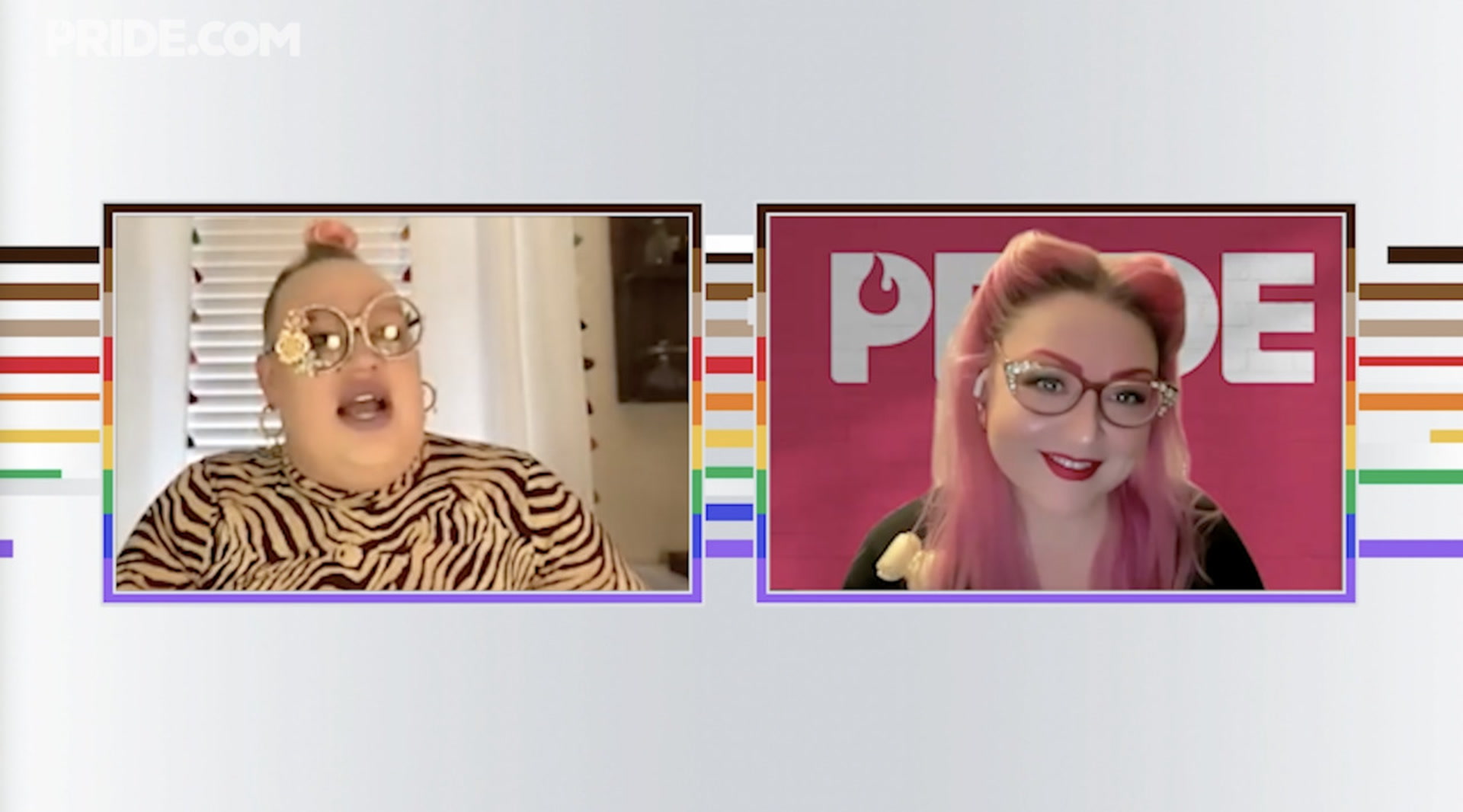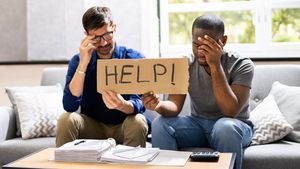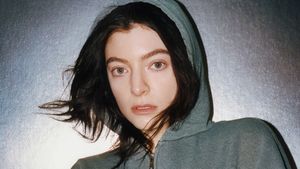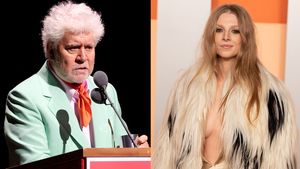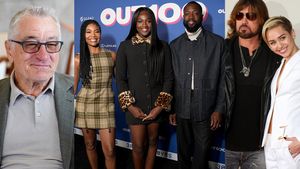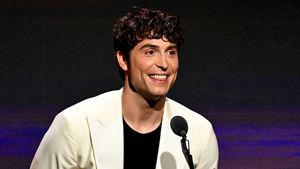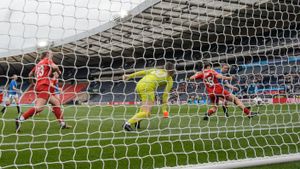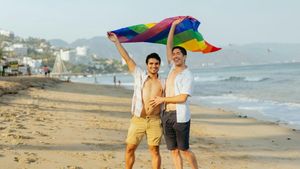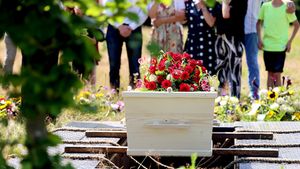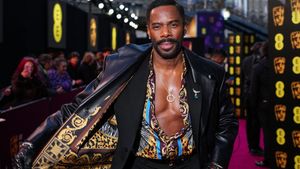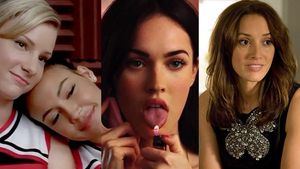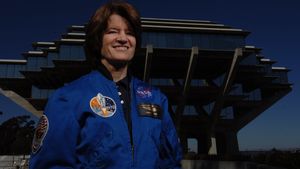Eureka O’Hara has dropped the video for her new single “Big Mawma”. It’s a soulful banger and an empowerment anthem inspired by the women in her life who helped lift her up throughout a traumatic and lonely childhood. It’s infused with the spirit of unconditional love that her mother and grandmother showed her.
On the track, she teams up with The Voice alums Sarah Potenza and Katie Kadan, who she found herself being drawn to and connecting with throughout the pandemic. In the video, the three of them tell a powerful and ultimately uplifting story of self-acceptance, mirroring a journey that Eureka herself has traveled, particularly as it pertains to her coming out as a trans woman.

Sean Vadella
Transition is a recurring theme in Eureka’s life at the moment, which sees the drag performer branching out and exploring new forms of self-expression. That’s true whether that’s on her hit, Emmy Award-winning docuseries We’re Here, which is currently airing in its third season, or in her recent roles on American Horror Story,The L Word: Generation Q, and Love, Victor.
PRIDE sat down with Eureka to talk about her new music, career paths, future, and how they all connect to her ability to overcome struggles and pain, then turn them into motivation and a platform to uplift herself and others.
This interview was edited for grammar and conciseness.
PRIDE: You’re so busy! How do you take care of yourself?
Eureka O'Hara: I think self-care is very important. Honestly, a lot of it is self-reflection for me. I take time to be alone to remind myself to keep the demons at bay, I guess. Keep the anxiety down, keep the voices or that demon on her shoulders or that little insecurity in the back of her head that tries to get at me. It was, you know, taught to me at a young age. And it’s something that I still have to sit down and have a conversation with them every now and then.
Your new song “Big Mawma” has a very empowering message, and I understand that it was inspired by some of the women in your life.
My mother and my grandmother were the women that were always there for me growing up. They were my best friends. I was very ostracized and picked on and separated and isolated a lot growing up in East Tennessee, just being so big and being so queer and being so effeminate. I dealt with some childhood trauma where I had wet the bed till I was like, 13. So I didn’t go to people’s houses, I was always home. So my best friends were my mom and my grandmother. And I lost them in the last three years. And it really got hard continuing to have that drive to want to succeed. Because that drive to succeed was to make them proud.
I kind of went through a dark time about a year ago, where I just fell into partying a lot and drinking a lot. And I ended up going to rehab, actually, for 45 days. I’ve been clean for 10 months and it’s really been the best thing for me.
That’s where the song kind of came to life through that process. I had to learn that Big Mawma’s spirit that I got from them was actually within myself, but also within these other people that loved me unconditionally.
I was also very inspired by Katie Kadan during the pandemic, so I really wanted to work with her on this song too, just because of her empowering golden voice and her flashy style. She was very good and positive and inspiring to me during the pandemic. So was Sarah Potenza online, we connected a lot. So, I decided to pull them in as representations of [my mom and grandmother]. Katie being that spiritual, fun-loving, goofy [person] like my grandmother. And then Sarah having that more dominant personality, [the] take-care-of-shit kind of girl, like my mom. So, they’re very inspired and coexist, I guess. I’ts almost like, I gotta do it with versions of my mother and grandmother.
Watch PRIDE's full interview with Eureka O'Hara below.
That’s beautiful how you can honor them with this video. Speaking of which, it plays out a bit like a short film. There are two versions of you a masc-presenting version and one that explores their gender. It kind of felt like two versions of you, one who found that Big Mawma love early and one that didn’t, am I on the right track?
It’s very inspired by those types of storylines. I was fortunate enough to find that spirit and love in a really close friend of mine early in life, high school, about my senior year I came out, you know, and then the other side is like, what if I didn’t, you know, but also inspired by people that live to that married age and ignore that part of themselves for so long. And then it just continues to break them down. And that’s what creates evil within them sometimes and the pain. And that’s where you see the representation of the man screaming at his wife over the food he boozed out on the couch, drinking, looking ran down, you know, just that level of pressure, also depression and disdain that you that becomes within oneself when you’re pretending to be something that you’re not, which I did learn from.
Also, it’s kind of a representation of a story that one of my drag children shared with me. [They] inspired me in this season to take the leap and just look at myself as far as who I am and where I’m at in my transition. [It] made me realize a lot of the darkness I’ve been going through was me trying to ignore the fact that I’m a trans female, and trying to live in this contentment of being nonbinary when it’s partially who I am. And I love representing that community, but it’s not fully who I am. It’s still me, holding back.
Eureka O'Hara - Big Mawma (feat. @KatieKadan & @SarahPotenzaMusic) [Official Music Video]
Your evolving story is very inspiring. Have you changed your pronouns?
I’m them/she/her... this time to explore my gender expression and my identity.
I waited until I came out on [We’re Here], which gave me this opportunity to prepare myself and get things ready before I’m thrust into this public spotlight as a trans individual. Because another thing with the platform that I have, coming out as a trans woman is going to push me into another segment of representation for our community. And I just wanted to fully be ready for that.
Your platform is just getting bigger, with acting roles on shows like The L Word: Generation Q and American Horror Story. Do you have any special memories from being on set?
On American Horror Story, I remember just sitting there in that environment with Evan Peters and Alex, the director, and these people that I look up to already, and just being like, oh my god, this is what I love to do. This is where I want to be every day, on set, acting. It’s just what I’ve always dreamed of ever since I was little. My go-to place was movies and TV growing up, because that’s where I got lost in other worlds. I idealized Chris Farley, John Goodman, and Queen Latifah and — RIP her social game — but even Roseanne, sadly. Those were the people that looked like women I knew or looked like me. That’s where I could hopefully fall into this entertainment industry, which is still my goal. I want to be the trans-Chris Farley.

Johnnie Ingram
Let’s talk about We’re Here, it’s such a special show. It really changes people’s lives both on the show and in the audience, because it’s such an empathy bomb. But it also means that you have to be on the front lines in places where your identity is highly politicized. How do you deal with those situations?
The thing is, being me, I’m a very large flamboyant person, whether I’m presenting female or not. I’m a noticeable person because I dress flashy and as queer as I want to. I have a big personality, I have a large energy and a presence to me. And so I’m always being noticed anywhere I go, you know, and I just had to learn along the way to own the space that I take up. So for me, that’s where it’s at, but I still have moments where it can be overwhelming at times. But luckily, we have such huge support. And I have my sisters there.
It can be scary, but at the same time, I feel very supported. So I don’t even notice that most of the time, because I’m in such a safety bubble.

Johnnie Ingram
In the first episode, you visited Granbury, Texas and there were times when it felt really scary. Knowing you have a safety bubble is reassuring.
I might have been the most dangerous thing in that episode. Bob had to step in and be like Eureka, you need to calm down because I was like arguing with Christian people. And I was getting very passionate because it was just very offensive to me. I mean, you’ll see in the episode where I’m getting very passionate, I need to walk away. But there’s a deeper part where I was literally walking up on these people and Bob was like, “Eureka, you need to back up” and I was like, “You need to back up Bob.” I was like, “Okay, you’re right. I’m gonna go.” Because, you know, sometimes we get passionate, too. I know I do. I’m very, very passionate. And it’s hard for me not to let that take over sometimes.
Let’s circle back to your music. What’s next for you? An album? A tour?
I definitely see a tour happening next year. I have some music that I want to put together, make an album maybe, and maybe add some more tracks. I live life by my bootstraps like they say in East Tennessee.
I have another song in the barrel that I'm wanting to release. It's called “Bow Down”. I'll give you a sneak peek. It's gonna be something that I want to release next year where it's the new Eureka [and] she has fully realized that she's the queen, no matter what crown she didn't win, when honey she built a castle with the stones life threw at her, so y'all to bow down kind of attitude.
From Your Site Articles
Related Articles Around the Web










































